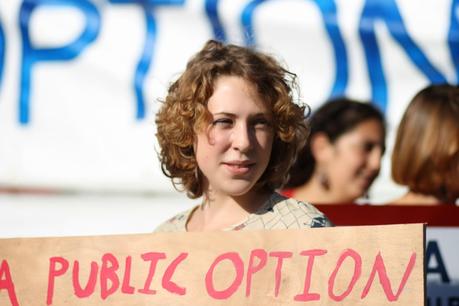
Image: http://www.wikipedia.org/
Two major takeaways from Obama-era politics are a heightened sense of polarity between party members; both at-large and in office, and a mutual distrust across party lines. Whether or not you believe the systemic dysfunction falls squarely on Barack Obama's shoulders, it is hard to ignore the divisive results of his policy initiatives. Campaigning on bipartisanship, Obama pledged to cross the isle at every opportunity, crafting policy endorsed by Democrats and Republicans alike. In practice, the Commander In Chief has not lived up to many of the promises he made up-front, including his assurances that he would be a President of unity, rather than the polarizing figure he has become. While spin plays a role in Presidential politics, no matter who's in office, Obama's administration has taken accountability levels to all-time lows. As a result, Americans do not trust Obama policies.
Missteps Erode Public Trust
More than any past President, Barack Obama mobilized populist support using charisma and lofty pledges of government transparency. In doing so, he made believers out of supporters expecting decisive action from his administration. Unfortunately, Obama's track record includes a laundry list of failures, disappointing even his most devoted supporters.Benghazi - We don't know exactly what took place in Benghazi, in part because the Obama administration has put forth inconsistent information about the fatal attack on Ambassador Chris Stevens and others. Worse yet are clear attempts by the Obama administration to spin its own involvement and response to the attack, including Hillary Clinton's now famous outburst before Congress: "What does it matter". The problem for Americans is misinformation leaked immediately after the attack, crediting a protest in the area for spurring the killings. The administration toed the line, sending its representatives to press pools with a carefully crafted explanation, but their assertions about a protest have been fully debunked. A timely Senate report, issued in 2014 shows that attackers were linked to Al Qaeda groups and that the Obama administration failed to respond to ample warnings pointing to increased terrorist activities in the region. One such alert, issued by Ambassador Stevens himself, came less than one month before he was killed in the attack. The amount of credibility lost by the Obama administration over Benghazi alone is enough to make most Americans distrustful of the President.
IRS Scandal - Further undermining Obama's pledge for bipartisanship and populist policies; reports show the country's most powerful bureaucracy used as a political device. The IRS apparently used its heavyweight status to knock down administration opponents, targeting conservative groups for harassment and undue scrutiny. True to form, administration response involved distancing the President from the wrongdoing, despite it unfolding under his own watch. The President's failure to keep powerful Government agencies in-line is another example of loose leadership, prompting mistrust among Americans.
Obamacare - The Obama administration's sweeping health reform, promising increased coverage for Americans; without sacrifices, has been another lesson in deception for informed citizens. One by one, as the plan rolled out in late 2013, Obama's promises were broken. For example, Obama made ironclad assurances when he was selling the legislation to Americans, promising they would always be able to keep the plans and doctors of their choosing. However, immediately following the launch of the unsustainable government program, millions of Americans were forced out of their existing insurance plans. Perhaps more than any single inconsistency offered by Obama, this high-profile fib cements Americans' mistrust of his administration's policies.
Author Bio: This is a guest post by Sarah Brooks from Freepeoplesearch.org. She is a Houston based freelance writer and blogger. Questions and comments can be sent to brooks.sarah23 @ gmail.com

